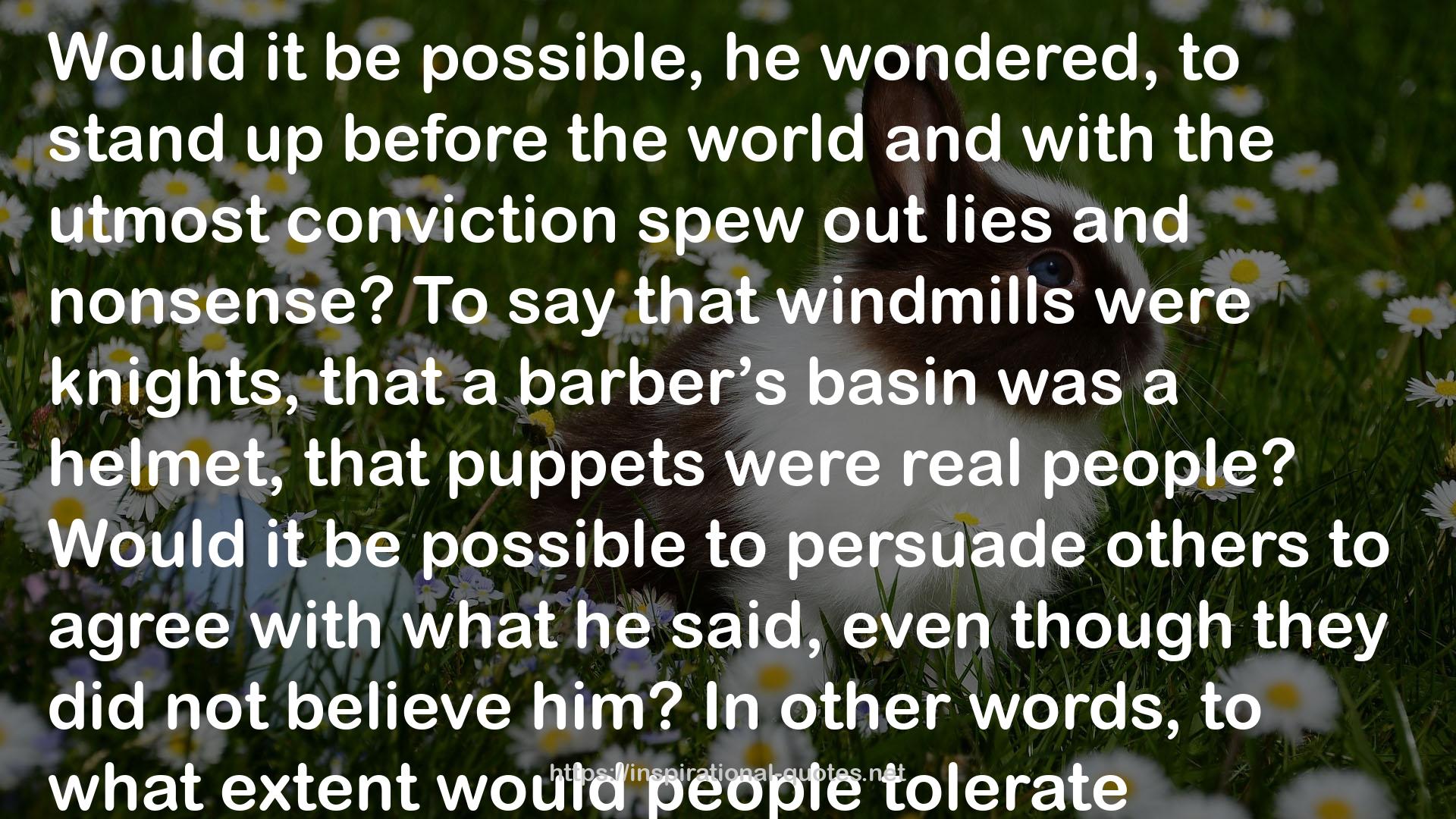3
" Each time he took a walk, he felt as though he were leaving himself behind, and by giving himself up to the movement of the streets, by reducing himself to a seeing eye, he was able to escape the obligation to think, and this, more than anything else, brought him a measure of peace, a salutary emptiness within...By wandering aimlessly, all places became equal and it no longer mattered where he was. On his best walks he was able to feel that he was nowhere. And this, finally was all he ever asked of things: to be nowhere. "
― Paul Auster , City of Glass (The New York Trilogy, #1)
16
" A language that will at last say what we have to say. For our words no longer correspond to the world. When things were whole, we felt confident that our words could express them. But little by little these things have broken apart, shattered, collapsed into chaos. And yet our words have remained the same. They have not adapted themselves to the new reality. Hence, every time we try to speak of what we see, we speak falsely, distorting the very thing we are trying to represent. It's made a mess of everything. But words, as you yourself understand, are capable of change. The problem is how to demonstrate this. That is why I now work with the simplest means possible - so simple that even a child can grasp what I am saying. Consider a word that refers to a thing - "umbrella", for example. When I say the word "umbrella", you see the object in your mind. You see a kind of stick, with collapsible metal spokes on top that form an armature for a waterproof material which, when opened, will protect you from the rain. This last detail is important. Not only is an umbrella a thing, it is a thing that performs a function - in other words, expresses the will of man. When you stop to think of it, every object is similar to the umbrella, in that it serves a function. A pencil is for writing, a shoe is for wearing, a car is for driving. Now, my question is this. What happens when a thing no longer performs its function ? Is it still the thing or has it become something else ? When you rip the cloth off the umbrella, is the umbrella still an umbrella ? You open the spokes, put them over your head, walk out into the rain, and you get drenched. Is it possible to go one calling this object an umbrella ? In general, people do. At the very limit, they will say the umbrella is broken. To me this is a serious error, the source of all our troubles. Because it can no longer perform its function, the umbrella has ceased to be an umbrella. It might resemble an umbrella, it might once have been an umbrella, but now it has changed into something else. The word, however, has remained the same. Therefore, it can no longer express the thing. It is imprecise; it is false; it hides the thing it is supposed to reveal. And if we cannot even name a common, everyday object that we hold in our hands, how can we expect to speak of the things that truly concern us? Unless we can begin to embody the position of change in the words we use, we will continue to be lost. "
― Paul Auster , City of Glass (The New York Trilogy, #1)
17
" So...what are you working on now?"
“Right now, an essay about Don Quixote.”
“One of my favorite books.”
“Mine too.”
“What’s the gist?”
“It has to do with the authorship of the books.”
“Is there any question?”
“I mean the book inside the book Cervantes wrote, the one he imagined he was writing.”
“Ah.”
“Cervantes claims he is not the author, that the original text was in Arabic.”
“Right. It’s an attack on make-believe, so he must claim it was real.”
“Precisely. Therefore, the story has to be written by an eyewitness yet Cid Hamete Benengeli, the acknowledged author, never makes an appearance. So who is he? Sancho Panza is of course the witness – illiterate, but with a gift for language. He dictated the story to the barber and the priest, Don Quixote’s friends. They had the manuscript translated into Arabic. Cervantes found the translation and had it rendered back into Spanish. The idea was to hold up a mirror to Don Quixote’s madness so that when he finally read the book himself, he would see the error of his ways. But Don Quixote, in my view, was no mad. He only pretended to be. He engineered the collaboration, and the translation from Arabic back into Spanish. I like to imagine Cervantes hiring Don Quixote in disguise to decipher the story of Don Quixote.”
“But why did Quixote go to such lengths?”
“He wanted to test the gullibility of man. To what extent would people tolerate blasphemies, lies, and nonsense if they gave them amusement? The answer: to any extent. For the book is still amusing us today. That’s finally all anyone wants out of a book. To be amused. "
― Paul Auster , City of Glass (The New York Trilogy, #1)
20
" He read many books, he looked at paintings, he went to the movies. In the summer he watched baseball on television in the winter he went to the opera. More than anything else, however, what he liked to do was walk. Nearly every day, rain or shine, hot or cold, he would leave his apartment to walk through the city—never really going anywhere, but simply going wherever his legs happened to take him. "
― Paul Auster , City of Glass (The New York Trilogy, #1)

